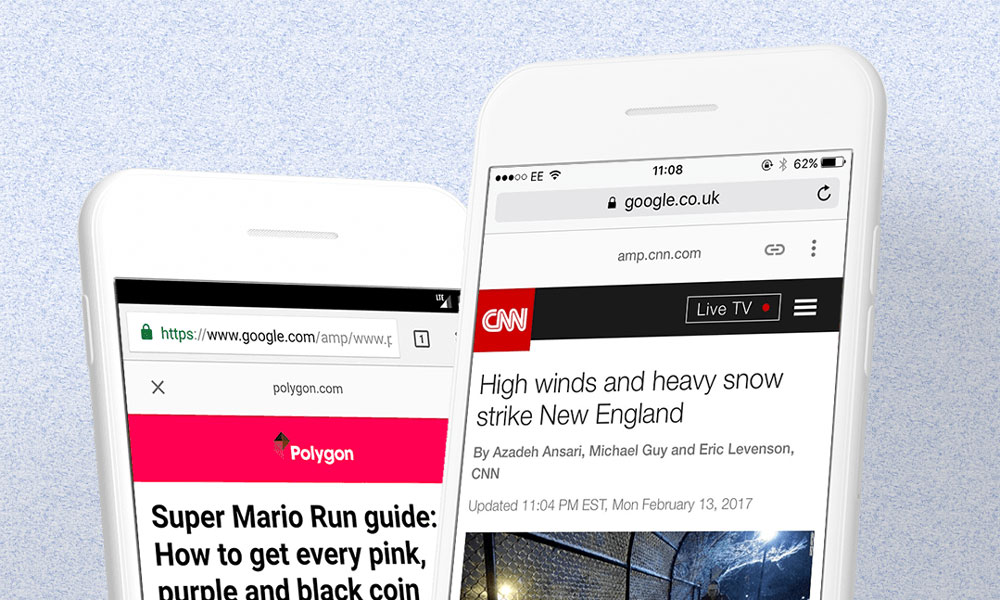
The Great AMP Debate: The Ethics of Google’s Mobile Traffic Boost
A lot of websites are seeing mobile traffic growth from using Google’s open-source AMP protocol, but critics are raising some big ethical questions. Are those concerns enough to dissuade organizations from using AMP?
If you’re interested in seeing mobile web traffic results, using Google’s AMP protocol—which is, very shortly, heading to email—makes a lot of sense.
But before you get ahead of yourself, it’s worth noting that a lot of critics of the protocol, also known as Accelerated Mobile Pages, have emerged since it was launched two and a half years ago.
Here’s the issue, according to some observers: AMP is seen as a way to speed up pages due to changes it makes to the HTML protocol, changes that also have the side effect of making the HTML more proprietary and more Google-centered.
AMP pages do better in Google’s search results—a big win from an SEO perspective—but it also creates lock-in with a company that’s already well-established as one of the largest in the world.
Other tech giants have tried to do similar things in the past—Facebook’s Instant Pages is one example. But Google has seen more success than others in part because of its dominance in search and advertising. Google had no trouble plugging AMP pages into its existing ad technology, and it put many AMP pages right at the top of search results, providing a boost in traffic to those sites.
As Digiday reported recently, this is causing problems for developers that skip AMP entirely. While those using AMP saw their search traffic double in 2017, according to Chartbeat traffic cited by the piece, those who skipped out on AMP basically saw their search traffic flatline.
In an era when many organizations have downplayed search in favor of social, that is not insignificant.
A Growing Backlash
Publishers, including associations, are largely OK with this because the situation is more beneficial and consistent for them than the whims of Facebook. Developers have been the primary voice behind the AMP backlash.
It’s one that’s been bubbling up since 2015, with prominent names like Daring Fireball’s John Gruber and a bevy of programmers speaking up against the technology. While Google, which is quick to emphasize that AMP is an open-source protocol, has made changes in response to criticism, some critics believe that Google is trying to create a walled garden on the open web. Those concerns have ramped up in recent months.
In January, 21 individuals—among them responsive design inventor Ethan Marcotte, Swedish politician Amelia Andersdotter, and W3C Technical Architecture Group Chair Daniel Appelquist—put online an open letter to Google raising concerns about the company’s implementation of the protocol. (It has since been signed by 563 other people.)
“AMP can remain one of a range of technologies that give publishers high-quality options for delivering web pages quickly and making users happy,” the letter argued. “However, publishers should not be compelled by Google’s search dominance to put their content under a Google umbrella. The web is not Google, and should not be just Google.”
Speed is a big factor for many organizations that have bought into AMP, but some are skeptical of whether AMP really makes the difference. One Dutch developer, Ferdy Christant, recently argued in a Medium post that the speed advantage should be credited to Google’s own servers preloading content onto your mobile device, rather than the AMP technology itself.
“If Google would have a genuine interest in speeding up the whole web on mobile, it could simply preload resources of non-AMP pages as well,” he wrote. “Not doing this is a strong hint that another agenda is at work, to say the least.”
Should You Care?
Now, this is definitely a debate that associations should know about, as it raises the kind of walled-garden concerns that come up every time we talk about relying too heavily on a social network for attention.
But the subject is admittedly wonky, and developers have been known to take some hard-line stances on certain issues—for example, one of the most prominent open-source software licenses, the GNU General Public License, comes from a nonprofit that has been at the forefront of an ideological free-software movement.
On the other hand, the AMP debate feels different, because it reflects the reality that a small handful of large companies can control what it means to run a business or organization on the internet—a defining story of our times, a theme that plays out in ways big and small throughout our society. Associations are not immune to these issues.
Granted, you may look at the traffic benefit from AMP—or get excited about what Google promises out of AMP for Email—and find the debate a nothingburger. You may conclude that the critics’ arguments aren’t as compelling as the possibility of cracking the code on Google. And that’s fine.
But it’s still an interesting controversy that speaks to the fragility of the modern web and how that fragility sometimes raises ethical questions that you might struggle to navigate—even when you’re just trying to maximize your organization’s performance online.
(screenshots via the AMP Project homepage)






Comments